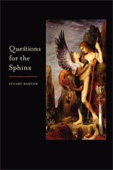Review by Marcie Newton
WordTech Editions
P. O. Box 541106
Cincinnati, OH 45254-1106
ISBN: 9781936370405
2011, 85 pp., $18.00
www.wordtechweb.com
Questions for the Sphinx by Stuart Bartow is, in a word, spectacular. Divided into three sections, “Myths,” “Stars,” and “Enigmas,” I accompany our poet-hero on an epic journey as he ponders some of life’s big questions in relation to life, death, love, and power. As the murmurs of answers sought from the beginning of time waver uncertainly in the lure of a siren’s song, I find myself wrapped up in a picture of power, rebellion, and ultimately in an uncertain victory. Moths, locusts, washed-up heroes, tyrannical forces, and intoxicating sirens make up part of the cast in this exciting collection of poems.
What struck me first about this book was the painting by Gustav Moreau on the front cover, which corresponds to its namesake poem, “Gustav Moreau’s Oedipus and the Sphinx” in the section “Myths.” In the painting, the Greek Sphinx’s bare, seductive breasts and hungry expression reach out towards Oedipus: “her gaze suggests she desires to do more/ with Oedipus than eat him.” Her wings stand erect and her claws lie staunchly in place on Oedipus’ body, but he stands firm as he challenges the sphinx’s gaze; they then plunge into depths unfathomable and forbidden. Our hero poignantly asks, “why is the red chain/ around your waist the same color as my spear?” In an instant, I am hurled into a mythological quagmire, armed only with the knowledge that with a sturdy spear (or pen) Oedipus will pierce the Ages and starry oceanic dimensions and let spill the blood of our future dreams and desires.
The sexual symbolism in this poem is dynamic. Power dominates the scene, and who will prove to be the stronger opponent?
Nameless,
doom-fated as the man
about to banish her
with one word, has terror already
loosened her grip, her claws
still hooked into his thighs?
The Sphinx has no name, but as her narcissistic claws dig into Oedipus, I know she has the power of flight, the brute force of speed, sharp talons, and an intoxicating beauty. The sphinx is a beast, but she is all woman clinging to Oedipus as if chained to a rock. Although majestic, Oedipus is unmerciful.
It is with an eye to delivering larger metaphors of power and destruction that drives our poet-hero on, as expertly illustrated in “Starlings.” Our poet witnesses “riots in/ winter fields, such thousands I thought the earth/ had made itself legion.” As we funnel through the history of time, we burst forth in hordes like a spreading shadow to find
stippled shapes that nothing, no net binds,
the ground abandoning us in the way
of birds, leaving us to our envy and ache
to fly, our wax, our prophesies, locusts.
It is in the beautiful prose poem “Myrmidons” that Bartow brings his poetic genius to bear. He oscillates between the melodic soft lyrical quality of the homing pigeon in stark contrast to the cold circuitry of modern technology infused with staccato, crisp consonants, in order to deliver a message of politico-spiritual complexity: “The think tank dreams of a perfect army … [that] could direct from towers or rooms inside the Pentagon,” and “With godlike wrath we could deliver these swarms of locusts to eclipse our enemies, the sky over those who call us infidels.” The flight into rebellion creates a tension that lies between the lines and between the Ages, wreaking havoc in the poems.
In the sections “Stars” and “Enigmas,” it is the small and flighty moth with which Bartow has a particular fascination. In “Ascalapha Adorata,” the black witch of almost six inches wingspan is “crossed/ with unreadable scriptures of dark and light/ bands and lines that undulate unpredictably.” With echoes of the Blakean aesthetic, moths return on a cold winter’s night in heat and “launch into a false spring cast by fools,” only to find in “Tiger Moths” that they
emerge on night’s margins …
legions of them speckling forests, roadsides
flocking to streetlamps and porch lights
whirling like Dante’s damned, those lights
they mistake for stars, those beings we mistake for moths.
Where armies march like a legion doomed to die, the throbbing rhythm in each line reverberates with the sound of moths’ undulating wings wavering in the wind at twilight in an artificial light.
In “Imagines He Is Owl,” our poet recalls “an undulation as far as Andromeda,” where:
In winter, when snow is the scalding sky
inverted, my eyes close
like the lids of a goddess something else
has dreamt.
As our poet-hero comes to the end of an epic journey, I am reminded of where this journey began in “Syrens.” Provided with an elusive answer to his burning question, “Did I almost drown to find/ the source of that voice, the bringer of that spell?” our poet-hero soars through scorching skies above the rock on which the sphinx leans and cries out into a perfect wind, “I do/ not sing. I recite.”